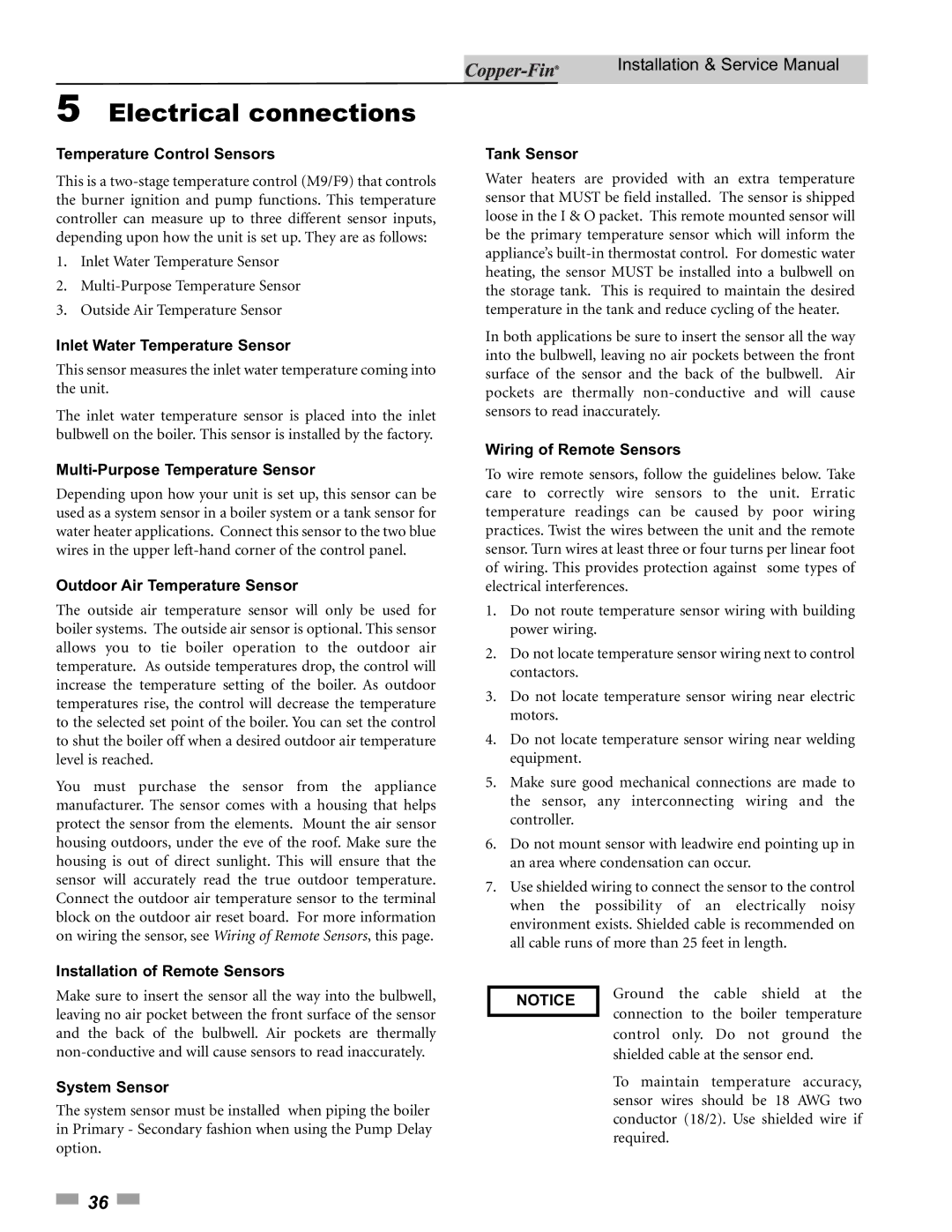5Electrical connections
Temperature Control Sensors
This is a
1.Inlet Water Temperature Sensor
2.
3.Outside Air Temperature Sensor
Inlet Water Temperature Sensor
This sensor measures the inlet water temperature coming into the unit.
The inlet water temperature sensor is placed into the inlet bulbwell on the boiler. This sensor is installed by the factory.
Multi-Purpose Temperature Sensor
Depending upon how your unit is set up, this sensor can be used as a system sensor in a boiler system or a tank sensor for water heater applications. Connect this sensor to the two blue wires in the upper
Outdoor Air Temperature Sensor
The outside air temperature sensor will only be used for boiler systems. The outside air sensor is optional. This sensor allows you to tie boiler operation to the outdoor air temperature. As outside temperatures drop, the control will increase the temperature setting of the boiler. As outdoor temperatures rise, the control will decrease the temperature to the selected set point of the boiler. You can set the control to shut the boiler off when a desired outdoor air temperature level is reached.
You must purchase the sensor from the appliance manufacturer. The sensor comes with a housing that helps protect the sensor from the elements. Mount the air sensor housing outdoors, under the eve of the roof. Make sure the housing is out of direct sunlight. This will ensure that the sensor will accurately read the true outdoor temperature. Connect the outdoor air temperature sensor to the terminal block on the outdoor air reset board. For more information on wiring the sensor, see Wiring of Remote Sensors, this page.
Installation of Remote Sensors
Make sure to insert the sensor all the way into the bulbwell, leaving no air pocket between the front surface of the sensor and the back of the bulbwell. Air pockets are thermally
System Sensor
The system sensor must be installed when piping the boiler in Primary - Secondary fashion when using the Pump Delay option.
Installation & Service Manual
Tank Sensor
Water heaters are provided with an extra temperature sensor that MUST be field installed. The sensor is shipped loose in the I & O packet. This remote mounted sensor will be the primary temperature sensor which will inform the appliance’s
In both applications be sure to insert the sensor all the way into the bulbwell, leaving no air pockets between the front surface of the sensor and the back of the bulbwell. Air pockets are thermally
Wiring of Remote Sensors
To wire remote sensors, follow the guidelines below. Take care to correctly wire sensors to the unit. Erratic temperature readings can be caused by poor wiring practices. Twist the wires between the unit and the remote sensor. Turn wires at least three or four turns per linear foot of wiring. This provides protection against some types of electrical interferences.
1.Do not route temperature sensor wiring with building power wiring.
2.Do not locate temperature sensor wiring next to control contactors.
3.Do not locate temperature sensor wiring near electric motors.
4.Do not locate temperature sensor wiring near welding equipment.
5.Make sure good mechanical connections are made to the sensor, any interconnecting wiring and the controller.
6.Do not mount sensor with leadwire end pointing up in an area where condensation can occur.
7.Use shielded wiring to connect the sensor to the control when the possibility of an electrically noisy environment exists. Shielded cable is recommended on all cable runs of more than 25 feet in length.
NOTICE | Ground the cable shield at the | |
connection to the boiler temperature | ||
| ||
| ||
| control only. Do not ground the | |
| shielded cable at the sensor end. |
To maintain temperature accuracy, sensor wires should be 18 AWG two conductor (18/2). Use shielded wire if required.
![]() 36
36 ![]()
